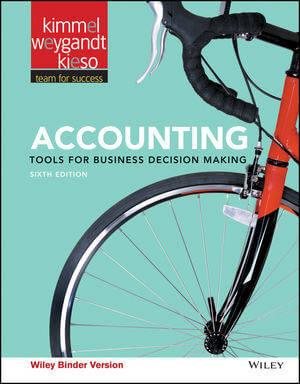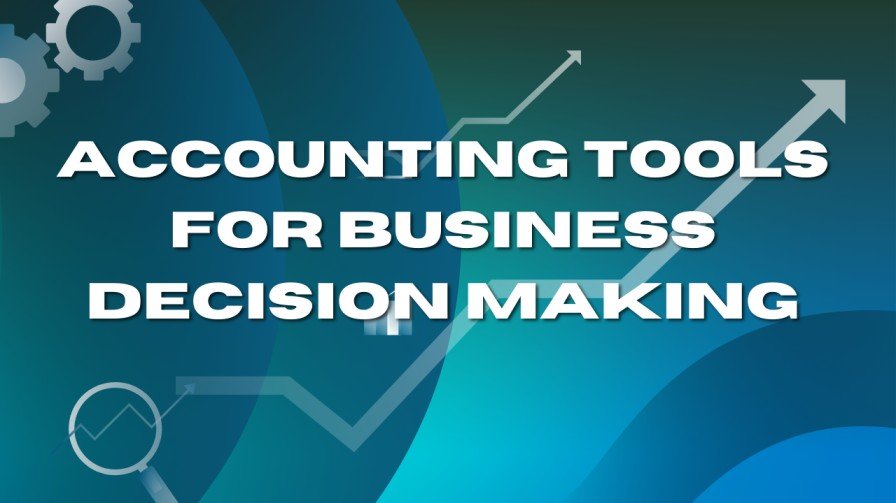Accounting tools for business decision-making help track financial performance and guide strategic planning. They provide accurate data for informed choices.
Businesses rely on accounting tools to manage finances and optimize operations. These tools include budgeting software, financial reporting systems, and cost management applications. Accurate financial data allows businesses to make informed decisions, forecast trends, and identify potential issues early. Effective use of accounting tools improves profitability and ensures compliance with financial regulations.
By leveraging these tools, businesses can streamline processes, reduce errors, and enhance overall efficiency. Accounting tools are essential for both small startups and large corporations, helping them stay competitive in a dynamic market. With the right tools, businesses gain a clearer financial picture and make strategic decisions that drive growth.

Credit: www.wiley.com
Importance Of Accounting Tools
In today’s fast-paced business environment, the use of accounting tools for business decision making has become indispensable. These tools not only streamline financial processes but also provide crucial insights that aid in strategic planning. Understanding the importance of accounting tools can significantly enhance a company’s ability to make informed decisions and drive growth.
Role In Decision Making
Accounting tools play a pivotal role in business decision-making by providing accurate and timely financial data. This data is essential for making informed choices that impact the company’s future.
Here are some key roles of accounting tools in decision making:
- Budgeting and Forecasting: Accounting tools help businesses create realistic budgets and forecasts, ensuring resources are allocated efficiently.
- Performance Analysis: These tools enable companies to track their financial performance, identifying areas that require improvement.
- Cost Management: By analyzing costs, businesses can find ways to reduce expenses and increase profitability.
- Investment Decisions: Accounting tools provide the financial metrics needed to evaluate investment opportunities.
Using Free accounting tools for business decision making can be particularly beneficial for small businesses, as they offer the same functionalities without the added cost. Here’s a comparison of some free and paid tools:
| Tool | Features | Cost |
|---|---|---|
| Wave | Invoicing, Expense Tracking | Free |
| QuickBooks | Comprehensive Accounting | Paid |
Impact On Business Success
The impact of Financial Accounting Tools for Business Decision Making on business success is profound. These tools provide the foundation for sound financial management, which is critical for any business to thrive.
Consider the following impacts:
- Improved Financial Health: Accurate financial data helps maintain a healthy balance sheet, ensuring long-term stability.
- Enhanced Decision-Making: With reliable data, businesses can make strategic decisions that foster growth and profitability.
- Regulatory Compliance: Accounting tools ensure that businesses comply with financial regulations, avoiding legal issues.
- Increased Efficiency: Automation of financial processes reduces errors and saves time, allowing focus on core business activities.
In essence, the right accounting tools can turn data into actionable insights, driving business success and ensuring competitiveness in the market. By integrating these tools, companies can not only manage their finances better but also make strategic decisions that lead to sustained growth.
Types Of Accounting Tools
Accounting tools for business decision making are essential for businesses of all sizes. They help manage finances, track expenses, and forecast future growth. There are various types of accounting tools available, each serving different purposes and offering unique features. Understanding these tools can help in making informed business decisions.
Software Solutions
Software solutions are modern accounting tools for business decision making. They streamline financial processes and offer real-time insights into a company’s financial health.
Here are some popular software solutions:
- QuickBooks: This software is highly popular among small businesses. It Provides invoicing, expense tracking, and payroll management services.
- FreshBooks: Known for its user-friendly interface, FreshBooks is great for freelancers and small business owners. It includes time tracking and project management features.
- Xero: Xero is suitable for small to medium-sized businesses. It provides bank reconciliation, invoicing, and inventory management.
Using these tools has several benefits:
- Automation: They automate repetitive tasks, reducing errors and saving time.
- Real-Time Data: Software solutions provide real-time financial data, which is crucial for making timely decisions.
- Accessibility: Cloud-based accounting tools are accessible from anywhere, making them perfect for remote teams.
Below is a comparison table of popular software solutions:
| Software | Best For | Key Features |
|---|---|---|
| QuickBooks | Small Businesses | Invoicing, Payroll, Expense Tracking |
| FreshBooks | Freelancers | Time Tracking, Project Management |
| Xero | Medium-Sized Businesses | Bank Reconciliation, Inventory Management |
Manual Methods
While software solutions are popular, manual methods still play a role in accounting tools for business decision making. They can be simple and cost-effective for very small businesses or startups.
Manual methods include:
- Spreadsheets: Commonly used tools such as Microsoft Excel or Google Sheets are frequently utilized. They allow for custom templates and manual data entry.
- Paper-Based Systems: Traditional paper-based methods involve keeping physical records and ledgers.
- Manual Calculators: Basic calculators or financial calculators are used for simple calculations.
Advantages of manual methods:
- Cost-Effective: They often come at no cost, making them accessible for businesses with tight budgets.
- Customizable: You can create custom formats and templates to suit specific needs.
- Control: Manual entry provides full control over the data without relying on software automation.
Despite these advantages, manual methods have drawbacks:
- Time-Consuming: Manual processes take more time compared to automated software.
- Error-Prone: Human error is more likely in manual entries.
- Limited Real-Time Data: Manual methods do not provide real-time financial insights.
Below is a comparison table of manual methods:
| Method | Best For | Key Features |
|---|---|---|
| Spreadsheets | Small Startups | Custom Templates, Manual Entry |
| Paper-Based Systems | Traditional Businesses | Physical Records, Ledgers |
| Manual Calculators | Basic Calculations | Simple Calculations, No Automation |
Popular Accounting Software
Businesses need accurate and reliable accounting tools for business decision making. With the right software, companies can manage finances, track expenses, and generate insightful reports. Popular accounting software options offer various features to assist in these tasks. Below, we explore some of the most widely used accounting software: QuickBooks, Xero, and FreshBooks.
Quickbooks
QuickBooks is a versatile accounting software designed to meet the needs of small and medium-sized businesses. It offers a user-friendly interface and comprehensive features to simplify financial management.
Key features of QuickBooks include:
- Invoicing: Create and send professional invoices quickly.
- Expense Tracking: Monitor business expenses effortlessly.
- Payroll Management: Simplify payroll processes.
- Financial Reporting: Generate detailed financial reports for better business decision making.
QuickBooks also offers various integrations with other business tools, enhancing its functionality. Here is a quick comparison of its plans:
| Plan | Price | Features |
|---|---|---|
| Simple Start | $25/month | Basic bookkeeping |
| Essentials | $50/month | Manage bills, multiple users |
| Plus | $80/month | Project tracking, inventory management |
Xero
Xero is an online accounting software that is ideal for small businesses. It offers a wide range of tools to manage financial transactions and improve business decision making.
Key features of Xero include:
- Bank Reconciliation: Automatically import and categorize bank transactions.
- Invoicing: Create and send invoices with ease.
- Expense Claims: Submit and approve expense claims online.
- Financial Reporting: Access detailed financial reports anytime.
Xero also supports multiple currencies and integrates with over 800 third-party apps. Here is a quick comparison of its plans:
| Plan | Price | Features |
|---|---|---|
| Starter | $20/month | Limited transactions |
| Standard | $30/month | Unlimited transactions |
| Premium | $40/month | Multi-currency support |
Freshbooks
FreshBooks is an accounting software tailored for freelancers and small business owners. It offers intuitive tools to streamline financial management and enhance business decision making.
Key features of FreshBooks include:
- Invoicing: Create professional invoices quickly and easily.
- Expense Tracking: Track expenses with receipt scanning.
- Time Tracking: Log billable hours with ease.
- Financial Reports: Generate insightful reports for better decision making.
FreshBooks also integrates with various payment gateways and other business tools. Here is a quick comparison of its plans:
| Plan | Price | Features |
|---|---|---|
| Lite | $15/month | 5 clients, basic features |
| Plus | $25/month | 50 clients, additional tools |
| Premium | $50/month | Unlimited clients, advanced features |
Key Features To Look For
Choosing the right accounting tools for business decision making is crucial for any business. These tools help in tracking finances, making informed decisions, and ensuring compliance. With so many choices available, how do you select the best one? Here are the key features to look for in financial accounting tools for business decision making.
User-friendly Interface
A user-friendly interface is essential for any accounting tool. It should be intuitive and easy to navigate. This ensures that even those with limited accounting knowledge can use it effectively. Look for tools that offer:
- Simple dashboard layout
- Easy navigation menus
- Clear and concise instructions
For example, a tool like QuickBooks offers a dashboard that shows all the important metrics at a glance. This includes:
| Metric | Description |
|---|---|
| Revenue | Shows total income |
| Expenses | Breaks down all spending |
| Profit | Calculates net profit |
Tools with a user-friendly interface minimize errors and save time. This enables business owners to concentrate on growth and strategic planning.
Reporting Capabilities
Reporting capabilities are vital for making informed decisions. The best free accounting tools for business decision making should offer robust reporting features. These include:
- Customizable reports
- Real-time data updates
- Visual representations like charts and graphs
For instance, tools like Xero provide detailed financial reports. These reports can include:
- Balance sheets
- Income statements
- Cash flow statements
Having access to detailed and customizable reports helps in understanding the financial health of the business. It also aids in identifying trends and making strategic decisions.
Integration Options
Effective integration options are another key feature of top accounting tools for business decision making. These tools should seamlessly integrate with other software systems. Key integration options include:
- CRM systems
- Payroll software
- Bank accounts
For example, FreshBooks integrates with popular tools like Salesforce and Gusto. This ensures a smooth flow of information between different systems. Integration options enhance efficiency by:
- Automating data entry
- Reducing manual errors
- Saving time on administrative tasks
Choosing tools with strong integration options ensures that all your business systems work together seamlessly. This creates a more efficient and streamlined workflow.
Benefits Of Using Tools
Every business needs accurate financial data to make informed decisions. Accounting tools for business decision making provide many benefits. These tools improve accuracy, save time, and enhance overall efficiency. Using accounting tools ensures businesses stay on top of their financial health and make smarter decisions.
Increased Accuracy
Using accounting tools for business decision making significantly improves accuracy. Manual calculations can lead to errors, but automated tools reduce this risk.
Here are some key benefits of increased accuracy:
- Error reduction: Automated tools minimize human errors.
- Consistent data: Financial data remains consistent and reliable.
- Real-time updates: Tools provide up-to-date financial information.
Accuracy is crucial for financial reporting and compliance. Businesses must ensure their records are precise. Financial Accounting Tools for Business Decision Making provide features such as:
| Feature | Benefit |
|---|---|
| Automated calculations | Reduces human error |
| Data validation | Ensures data integrity |
| Audit trails | Tracks changes and updates |
These features ensure that businesses have reliable data for decision making. Free accounting tools for business decision making also offer many of these benefits without extra costs.
Time Efficiency
Using accounting tools for business decision making saves time. Manual processes can be time-consuming and tedious, but automated tools speed up these tasks.
Here are some ways these tools improve time efficiency:
- Automated reporting: Generates reports quickly.
- Data synchronization: Updates data across systems instantly.
- Task automation: Automates repetitive tasks.
Time efficiency is essential for businesses to stay competitive. Financial Accounting Tools for Business Decision Making include features like:
| Feature | Benefit |
|---|---|
| Batch processing | Handles multiple transactions at once |
| Real-time data access | Provides instant insights |
| Customizable dashboards | Shows key metrics at a glance |
These features help businesses focus on strategic tasks rather than mundane chores. Free accounting tools for business decision making offer similar features, making them accessible for small businesses.
Challenges In Adoption
Accounting tools for business decision making are essential for modern enterprises. These tools help in analyzing financial data, forecasting, and strategic planning. Despite their numerous benefits, businesses face several challenges in their adoption. Understanding these challenges is crucial for a smooth transition and effective utilization of these tools.
Cost Considerations
The cost of accounting tools for business decision making can be a significant barrier. Small businesses often struggle with budgeting for these tools. Here are some key cost considerations:
- Initial Purchase Cost: High-quality financial accounting tools for business decision making often come with hefty price tags. This initial investment can be daunting.
- Subscription Fees: Many tools operate on a subscription model. Monthly or annual fees can add up quickly.
- Additional Modules: Some tools require additional purchases for extra features. These can include payroll management, tax calculations, or advanced analytics.
- Hidden Costs: Businesses might face unexpected expenses for software updates or technical support.
Here’s a table summarizing the cost factors:
| Cost Factor | Description |
|---|---|
| Initial Purchase | One-time cost for acquiring the tool. |
| Subscription Fees | Recurring costs for using the tool. |
| Additional Modules | Extra cost for additional features. |
| Hidden Costs | Unexpected expenses like updates or support. |
These cost considerations can deter businesses from adopting new accounting tools, especially for small enterprises.
Training Requirements
Another challenge in adopting accounting tools for business decision making is the training required. Employees must learn to use these tools effectively to maximize their potential. Key training requirements include:
- Initial Training: New users need comprehensive training sessions. This helps them understand the basic functionalities.
- Ongoing Training: Continuous education is essential to keep up with software updates and new features.
- Customized Training: Different departments might need specialized training. For instance, finance teams might need advanced training compared to administrative staff.
- Technical Support: Access to technical support is crucial for resolving issues promptly. This support can include webinars, tutorials, and dedicated support teams.
Businesses must allocate time and resources for these training programs. Here’s a quick overview of training needs:
| Training Type | Description |
|---|---|
| Initial Training | Basic training for new users. |
| Ongoing Training | Continuous learning for updates and new features. |
| Customized Training | Department-specific training programs. |
| Technical Support | Access to expert help and resources. |
Effective training ensures that employees can maximize the benefits of accounting tools for business decision making. Without proper training, businesses might face inefficiencies and errors.
Real-world Case Studies
Choosing the right accounting tools for business decision making is crucial. They provide valuable insights into financial health, helping businesses make informed choices. In this post, we dive into Real-World Case Studies that illustrate the impact of these tools. Learn from both small businesses and large corporations that have leveraged accounting software to drive success.
Small Business Success
Small businesses often operate with limited resources. Effective accounting tools for business decision making can make a significant difference. Let’s look at a few real-world examples:
- Bakery Bliss: A local bakery struggling with cash flow issues turned to a free accounting tool. This tool helped them track expenses and revenue more accurately. Within six months, their profit margins improved by 20%.
- Tech Start-Up Spark: A small tech start-up used financial accounting tools to forecast future expenses. This allowed them to secure additional funding. They saw a 30% increase in investor interest.
Below is a table showing how these tools impacted their financials:
| Business Name | Issue | Tool Used | Result |
|---|---|---|---|
| Bakery Bliss | Cash Flow Issues | Free Accounting Tool | 20% Profit Margin Increase |
| Tech Start-Up Spark | Expense Forecasting | Financial Accounting Tool | 30% Increase in Investor Interest |
These examples highlight how free accounting tools for business decision making can be a game-changer for small businesses. They enhance financial visibility and enable better decision-making.
Large Corporation Examples
Large corporations also benefit from robust accounting tools. Here are some real-world examples:
- Global Retail Giant: This company used advanced financial accounting tools to streamline operations. They reduced overhead costs by 15%, leading to higher profit margins.
- Multinational Manufacturing Firm: By implementing a comprehensive accounting software, they improved their supply chain management. This resulted in a 25% reduction in production costs.
Below is a table showcasing the outcomes:
| Corporation | Issue | Tool Used | Result |
|---|---|---|---|
| Global Retail Giant | High Overhead Costs | Advanced Financial Accounting Tools | 15% Cost Reduction |
| Multinational Manufacturing Firm | Inefficient Supply Chain | Comprehensive Accounting Software | 25% Production Cost Reduction |
These case studies demonstrate how financial accounting tools for business decision making can lead to significant savings and operational efficiency. Large corporations can optimize their processes and gain a competitive edge.

Credit: www.wileyplus.com
Future Trends In Accounting Tools
Using modern accounting tools for business decision making can transform how businesses operate. The future trends in accounting tools promise even greater efficiency and precision. These tools are evolving rapidly, integrating cutting-edge technologies to meet the demands of businesses. Let’s dive into some of these exciting advancements.
Automation And Ai
Automation and AI are revolutionizing the field of accounting. These technologies streamline operations, reduce errors, and save time. Businesses can now automate repetitive tasks, allowing accountants to focus on strategic decision-making.
Key benefits of Automation and AI in accounting tools:
- Error Reduction: Minimize human errors in data entry and calculations.
- Time Savings: Automate routine tasks like invoicing and payroll.
- Enhanced Analytics: Use AI to analyze large datasets and uncover insights.
These advancements don’t just benefit large corporations. Even small businesses can access free accounting tools for business decision making that incorporate AI. This democratizes access to sophisticated tools, leveling the playing field.
A breakdown of how Automation and AI enhance accounting:
| Feature | Benefit |
|---|---|
| Automated Data Entry | minimizes manual work and reduces errors |
| Predictive Analytics | Forecasts financial trends |
| AI-Powered Audits | Identifies discrepancies quickly |
Cloud Computing
Cloud computing is another trend reshaping accounting tools for business decision making. Cloud-based platforms offer flexibility, accessibility, and security.
With cloud computing, businesses can:
- Access Data Anywhere: Work from any location with an internet connection.
- Ensure Data Security: Benefit from advanced security measures and regular updates.
- Scale Easily: Adjust resources as business needs change.
Many financial accounting tools for business decision making are now cloud-based. This means data is stored securely and is easily accessible. Businesses no longer need costly servers and IT infrastructure.
Here are some key advantages of cloud computing in accounting:
| Advantage | Explanation |
|---|---|
| Cost-Effective | Reduces the need for physical hardware |
| Real-Time Collaboration | Teams can work together in real-time |
| Automatic Updates | Ensures the latest features and security patches |
The shift to cloud computing is making accounting tools for business decision making more accessible and powerful. Businesses are better equipped to handle financial tasks with ease and efficiency.

Credit: www.wileyplus.com
Frequently Asked Questions
What Are Accounting Tools For Business?
Accounting tools help manage financial data, track expenses, and generate reports. They assist in making informed business decisions by providing accurate financial insights.
Why Are Accounting Tools Important?
Accounting tools are crucial for maintaining financial accuracy. They streamline processes, reduce errors, and provide valuable insights into business performance, aiding in strategic decision-making.
How Do Accounting Tools Improve Decision Making?
Accounting tools provide real-time data and financial reports. This enables businesses to make timely and informed decisions, enhancing overall efficiency and profitability.
Can Small Businesses Benefit From Accounting Tools?
Yes, small businesses can greatly benefit from accounting tools. They help manage finances, ensure compliance, and provide insights that are essential for growth and stability.
Conclusion
Choosing the right accounting tools is crucial for informed business decisions. These tools streamline processes and enhance accuracy. Implementing effective accounting solutions ensures better financial management. Stay ahead in the competitive market by leveraging these tools. Make smarter decisions and drive your business toward success.





4 thoughts on “Accounting Tools for Business Decision Making: Boost Your Profitability”